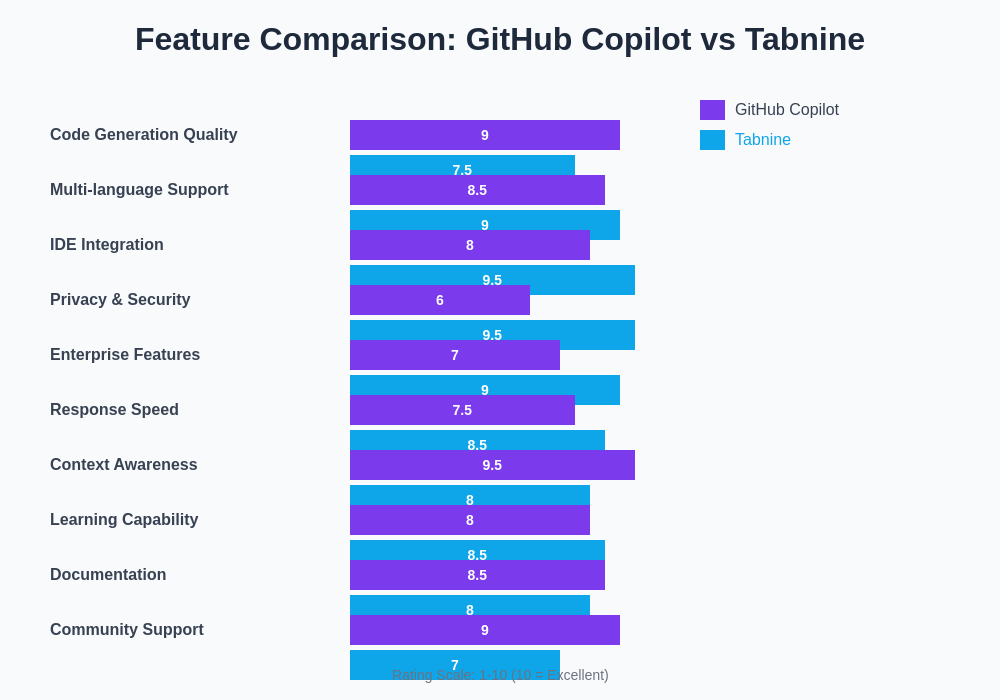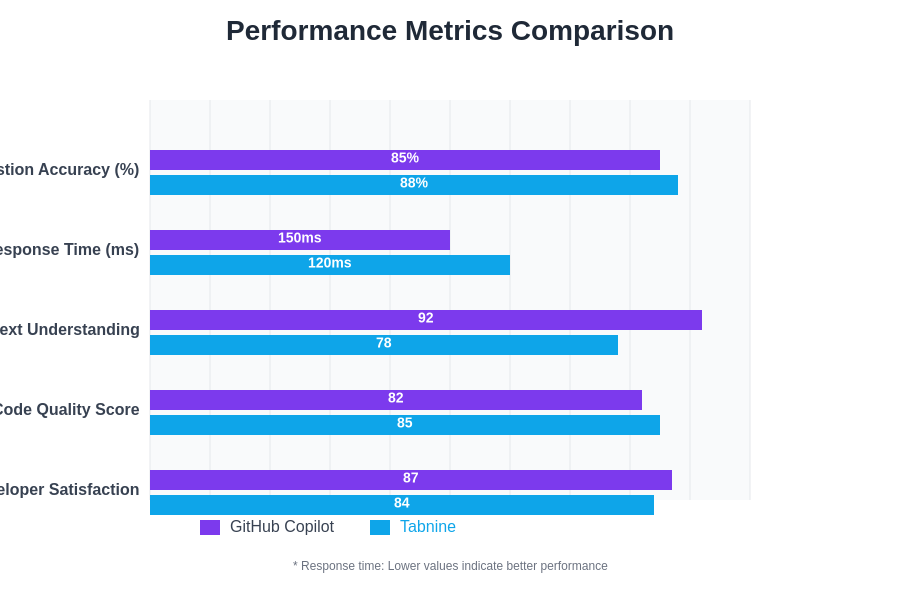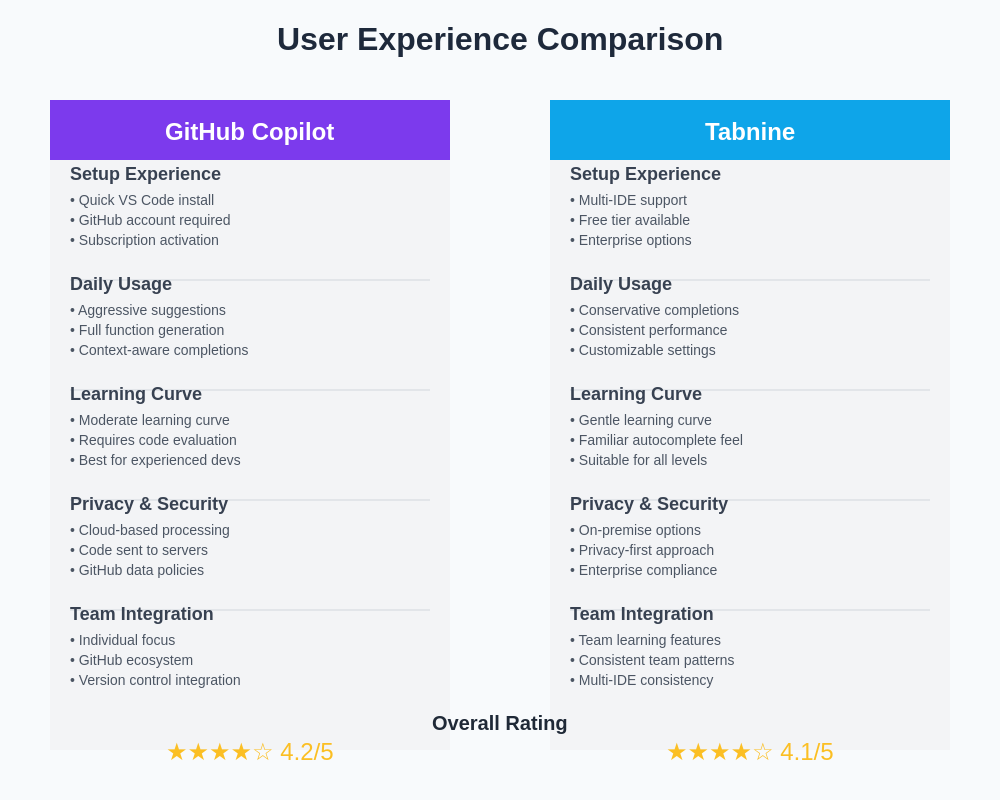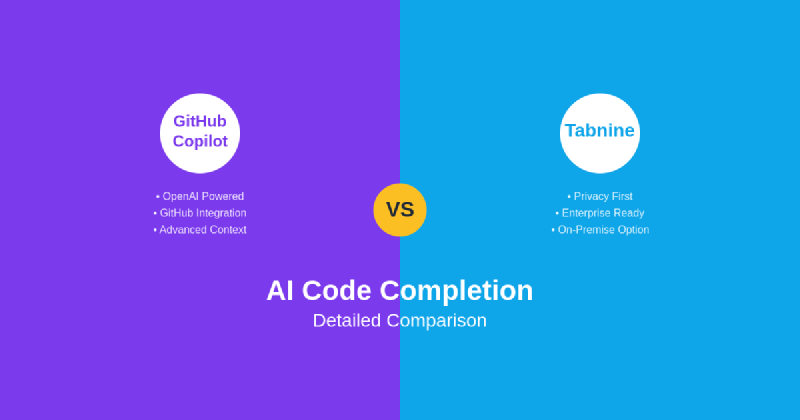The artificial intelligence revolution in software development has brought forth numerous tools designed to enhance developer productivity and code quality, with AI-powered code completion emerging as one of the most transformative innovations. Among the leading solutions in this space, GitHub Copilot and Tabnine stand out as two of the most sophisticated and widely adopted platforms, each offering unique approaches to intelligent code assistance that have fundamentally changed how developers write and maintain software.
Explore the latest AI development trends to understand how these tools fit into the broader ecosystem of artificial intelligence applications in software engineering. The comparison between GitHub Copilot and Tabnine represents more than just a feature analysis; it illuminates different philosophies about AI integration, privacy considerations, and the future direction of intelligent development environments.
Understanding AI Code Completion Evolution
The journey from traditional IDE autocomplete features to sophisticated AI-powered code completion represents a quantum leap in developer assistance technology. Traditional autocomplete systems relied on static analysis of existing code and predefined language constructs, offering limited suggestions based on immediate context and available variables or methods. Modern AI code completion tools like GitHub Copilot and Tabnine leverage advanced machine learning models trained on vast repositories of open-source code to understand patterns, idioms, and best practices across multiple programming languages and frameworks.
This evolution has transformed code completion from simple text substitution into intelligent code generation that can understand developer intent, suggest entire function implementations, and even generate complex algorithmic solutions based on comments or partial implementations. The sophistication of these tools has reached a point where they can serve as virtual pair programming partners, offering insights and suggestions that often exceed what human developers might immediately consider.
GitHub Copilot: The OpenAI-Powered Assistant
GitHub Copilot, developed through a collaboration between GitHub and OpenAI, represents one of the most ambitious attempts to create a truly intelligent coding assistant. Built on OpenAI’s Codex model, which itself is based on the GPT architecture, Copilot has been trained on billions of lines of public code from GitHub repositories, giving it an unprecedented understanding of coding patterns, conventions, and best practices across a vast array of programming languages and domains.
The core strength of GitHub Copilot lies in its ability to understand context not just from the immediate code being written, but from the broader project structure, imported libraries, and even comments describing intended functionality. This comprehensive understanding enables Copilot to generate remarkably accurate and contextually appropriate code suggestions that often require minimal modification before integration into existing codebases.
GitHub Copilot’s integration with the GitHub ecosystem provides additional advantages, including seamless access to repository context and the ability to understand project-specific patterns and conventions. The tool excels at generating boilerplate code, implementing common algorithms, and translating high-level descriptions into functional implementations across multiple programming paradigms.

The feature landscape between GitHub Copilot and Tabnine reveals distinct approaches to AI-assisted development, with each platform offering unique strengths that cater to different developer preferences and organizational requirements.
Tabnine: The Privacy-Focused Alternative
Tabnine has distinguished itself in the AI code completion market through its strong emphasis on privacy, security, and enterprise-friendly deployment options. Unlike GitHub Copilot, which relies primarily on cloud-based processing, Tabnine offers both cloud and on-premises deployment options, allowing organizations with strict data governance requirements to maintain complete control over their code and intellectual property.
Experience advanced AI development capabilities with Claude for comprehensive code analysis and generation tasks that complement traditional code completion tools. The combination of multiple AI assistants creates a powerful development environment that addresses various aspects of the software creation process.
The technical architecture of Tabnine is built around deep learning models specifically optimized for code completion tasks, with support for over 30 programming languages and integration with more than 15 popular IDEs and editors. Tabnine’s models are continuously updated and refined based on aggregated usage patterns while maintaining strict privacy protections that ensure individual code snippets are never stored or transmitted without explicit consent.
Tabnine’s approach to AI training involves creating specialized models for different programming languages and domains, allowing for more targeted and accurate suggestions within specific contexts. This specialization often results in highly relevant completions that understand language-specific idioms and best practices, particularly for enterprise codebases with established coding standards and architectural patterns.
Performance and Accuracy Analysis
The performance characteristics of GitHub Copilot and Tabnine reveal important differences in their underlying architectures and training methodologies. GitHub Copilot, leveraging the power of OpenAI’s Codex model, excels in generating longer code segments and understanding complex contextual relationships across large codebases. The tool’s ability to generate entire functions, classes, or even modules based on minimal input often results in impressive demonstrations of AI capability, though the quality and appropriateness of suggestions can vary significantly depending on the specific use case and domain.
Tabnine’s performance profile emphasizes consistency and reliability over ambitious code generation, with a focus on providing highly accurate short-to-medium length completions that integrate seamlessly into existing development workflows. The tool’s specialized models often demonstrate superior accuracy for common coding patterns and frequently used constructs within specific programming languages, making it particularly effective for developers working within established codebases with consistent styling and architectural patterns.
Response time and latency represent critical factors in the practical utility of AI code completion tools, as developers require near-instantaneous feedback to maintain productive flow states. GitHub Copilot’s reliance on cloud-based processing can occasionally introduce latency issues, particularly for developers with slower internet connections or those working in network-restricted environments. Tabnine’s hybrid approach, offering both cloud and local processing options, provides more consistent performance characteristics while accommodating various deployment scenarios and network conditions.
Language Support and Ecosystem Integration
The breadth and depth of programming language support significantly impact the practical utility of AI code completion tools for diverse development teams and projects. GitHub Copilot demonstrates exceptional capabilities across popular languages like Python, JavaScript, TypeScript, Java, and Go, with particularly strong performance in web development frameworks and modern programming paradigms. The tool’s training on GitHub’s extensive repository collection provides comprehensive coverage of open-source projects and popular libraries, resulting in accurate suggestions for common development scenarios.
Tabnine’s language support strategy emphasizes comprehensive coverage with specialized optimization for enterprise development scenarios. The platform provides robust support for both mainstream and niche programming languages, including legacy systems and domain-specific languages commonly encountered in enterprise environments. This broad compatibility makes Tabnine particularly attractive for organizations maintaining diverse technology stacks or supporting legacy applications alongside modern development initiatives.
IDE integration quality significantly influences developer adoption and satisfaction with AI code completion tools. GitHub Copilot’s native integration with Visual Studio Code provides an exceptionally smooth user experience, with seamless suggestion presentation and intuitive acceptance mechanisms. The tool’s expansion to other IDEs, including JetBrains products and Neovim, has broadened its accessibility while maintaining consistent functionality across different development environments.

The quantitative analysis of performance metrics reveals important trade-offs between GitHub Copilot and Tabnine across key dimensions that influence developer productivity and satisfaction.
Privacy and Security Considerations
Privacy and security concerns represent perhaps the most significant differentiating factors between GitHub Copilot and Tabnine, with implications that extend far beyond individual developer preferences to encompass organizational policies, regulatory compliance, and intellectual property protection. GitHub Copilot’s cloud-based architecture requires transmitting code context to external servers for processing, raising concerns among organizations with strict data governance requirements or those working on proprietary software with sensitive intellectual property.
The training data controversy surrounding GitHub Copilot has also generated significant discussion within the developer community regarding the use of public repositories for model training without explicit consent from original authors. While GitHub has implemented filters to reduce the likelihood of reproducing copyrighted code verbatim, concerns about potential license violations and intellectual property infringement continue to influence adoption decisions, particularly among organizations with risk-averse legal departments.
Enhance your development workflow with Perplexity for research and documentation tasks that complement AI code completion tools while maintaining data privacy and security standards. The integration of multiple AI tools requires careful consideration of data handling practices and privacy implications across the entire development pipeline.
Tabnine’s privacy-first approach addresses many of these concerns through its comprehensive data protection framework and flexible deployment options. The platform’s ability to operate entirely on-premises ensures that sensitive code never leaves organizational boundaries, while its commitment to never storing or learning from user code provides additional assurance for security-conscious organizations. Tabnine’s transparent privacy policy and detailed documentation of data handling practices have made it the preferred choice for many enterprise customers with stringent compliance requirements.
Pricing and Value Proposition
The economic considerations surrounding AI code completion tools involve both direct costs and indirect value creation through improved developer productivity and code quality. GitHub Copilot’s pricing model, integrated with GitHub’s broader ecosystem, offers competitive rates for individual developers while providing volume discounts for organizations with large development teams. The tool’s subscription-based pricing includes access to regular model updates and new features, ensuring that users benefit from ongoing improvements in AI capabilities and performance.
Tabnine’s pricing structure reflects its enterprise focus, with tiered options that accommodate different organizational needs and deployment preferences. The platform’s free tier provides basic functionality for individual developers, while professional and enterprise tiers offer advanced features, priority support, and enhanced security options. The ability to deploy Tabnine entirely on-premises justifies premium pricing for organizations that prioritize data sovereignty and regulatory compliance.
The value proposition analysis must consider not only the direct costs of these tools but also their impact on developer productivity, code quality, and team collaboration. Organizations adopting AI code completion tools often report significant improvements in development velocity, reduced time spent on routine coding tasks, and enhanced consistency across team outputs. These productivity gains can justify substantial tool investments, particularly for organizations with large development teams or those working on time-sensitive projects.
Integration and Workflow Impact
The successful integration of AI code completion tools into existing development workflows requires careful consideration of team dynamics, coding standards, and quality assurance processes. GitHub Copilot’s aggressive suggestion style can significantly accelerate development for experienced developers who can quickly evaluate and refine AI-generated code, but may overwhelm novice programmers who lack the expertise to assess suggestion quality and appropriateness.
Tabnine’s more conservative approach to code completion often integrates more smoothly into established development processes, providing valuable assistance without disrupting existing workflows or introducing potential quality concerns. The tool’s focus on smaller, highly accurate completions aligns well with traditional code review processes and quality assurance practices, making it easier for teams to adopt without significant changes to their established procedures.
The impact on code review processes represents another important consideration, as AI-generated code may require different evaluation criteria and review approaches compared to manually written implementations. Teams using aggressive AI completion tools often develop specialized review practices that focus on understanding AI-generated logic, verifying correctness, and ensuring compliance with established architectural patterns and coding standards.
Learning and Adaptation Capabilities
The ability of AI code completion tools to learn from user behavior and adapt to specific coding patterns significantly influences their long-term value and effectiveness within development teams. GitHub Copilot’s model architecture enables it to understand broad contextual patterns and generate sophisticated code suggestions based on extensive training data, but its learning occurs primarily at the model level through periodic updates rather than through individual user adaptation.
Tabnine’s approach to learning and adaptation emphasizes understanding team-specific coding patterns and organizational preferences while maintaining strict privacy protections. The platform’s ability to learn from collective team behavior without compromising individual privacy creates opportunities for customized code completion that aligns with specific project requirements and architectural decisions.
The feedback mechanisms built into these tools also influence their effectiveness over time. GitHub Copilot’s integration with development workflows provides implicit feedback through acceptance and rejection patterns, while Tabnine offers more explicit feedback collection mechanisms that enable users to improve suggestion quality through direct input and rating systems.
Developer Experience and User Interface
The user experience design of AI code completion tools significantly impacts developer adoption and satisfaction, with factors such as suggestion presentation, acceptance mechanisms, and integration seamlessness playing crucial roles in determining practical utility. GitHub Copilot’s user interface emphasizes simplicity and minimal disruption to existing coding workflows, with ghost text suggestions that appear directly in the editor and can be accepted with simple keyboard shortcuts.
The visual design and interaction patterns of these tools must balance visibility and informativeness with the need to avoid cluttering the development interface or disrupting developer focus. Tabnine’s approach to suggestion presentation offers more customization options, allowing developers to adjust the frequency, timing, and presentation style of suggestions to match their personal preferences and workflow requirements.
Configuration and customization capabilities represent another important aspect of developer experience, as different programming styles, project requirements, and team preferences may require varying levels of AI assistance. Both GitHub Copilot and Tabnine offer configuration options that enable developers to fine-tune tool behavior, though the depth and breadth of available customizations differ significantly between platforms.

The comprehensive analysis of user experience factors reveals important differences in how GitHub Copilot and Tabnine prioritize various aspects of developer interaction and workflow integration.
Performance in Different Development Scenarios
The effectiveness of AI code completion tools varies significantly across different development scenarios, programming domains, and project types. GitHub Copilot demonstrates exceptional performance in web development scenarios, particularly when working with popular JavaScript frameworks, Python data science libraries, and modern full-stack applications. The tool’s training on GitHub’s extensive repository collection provides comprehensive coverage of common development patterns and popular open-source libraries.
Enterprise application development presents unique challenges for AI code completion tools, including the need to understand proprietary frameworks, legacy system integration, and industry-specific requirements. Tabnine’s enterprise focus and customization capabilities often provide superior performance in these scenarios, with the ability to adapt to organization-specific coding patterns and architectural constraints.
Mobile development scenarios reveal interesting performance differences between these tools, with GitHub Copilot showing strong capabilities for React Native and Flutter development, while Tabnine provides more consistent performance across native iOS and Android development environments. The complexity of mobile platform-specific APIs and development patterns requires specialized understanding that varies between different AI models and training approaches.
Team Collaboration and Code Consistency
The impact of AI code completion tools on team collaboration and code consistency represents a critical consideration for organizations evaluating these platforms. GitHub Copilot’s ability to generate substantial code segments can lead to increased variation in coding styles and approaches within team environments, potentially requiring additional effort to maintain consistency and adherence to established coding standards.
Tabnine’s focus on smaller, more targeted completions often results in better alignment with existing team coding patterns and organizational standards. The tool’s ability to learn from team-specific coding patterns while maintaining privacy protections enables it to reinforce established conventions and best practices across development teams.
The long-term implications for code maintainability and team knowledge sharing also require consideration. Code generated by AI tools may lack the implicit knowledge and reasoning that human developers would typically embed in their implementations, potentially creating challenges for future maintenance and enhancement activities.
Future Development and Roadmap Considerations
The rapidly evolving landscape of AI code completion technology requires consideration of future development trajectories and platform roadmaps when making adoption decisions. GitHub Copilot’s integration with Microsoft’s broader AI ecosystem and access to cutting-edge language models from OpenAI suggests continued advancement in code generation capabilities and integration with additional development tools and platforms.
Tabnine’s focus on enterprise requirements and privacy protection positions it well for continued growth in security-conscious organizations and regulated industries. The platform’s investment in specialized models and deployment flexibility indicates a commitment to serving diverse organizational needs while maintaining strict privacy and security standards.
The broader trend toward AI-assisted development suggests that both platforms will continue evolving to address emerging developer needs and technological challenges. Integration with additional development lifecycle tools, enhanced understanding of software architecture patterns, and improved collaboration features represent likely areas of future development for both platforms.
Making the Right Choice for Your Development Needs
The decision between GitHub Copilot and Tabnine ultimately depends on a complex array of factors including organizational requirements, privacy concerns, development team characteristics, and specific project needs. Organizations with strong open-source development cultures and permissive data sharing policies may find GitHub Copilot’s aggressive code generation capabilities and extensive training data particularly valuable for accelerating development processes and exploring new programming approaches.
Teams working on proprietary software, operating in regulated industries, or maintaining strict intellectual property protections may find Tabnine’s privacy-first approach and flexible deployment options more aligned with their operational requirements. The platform’s ability to provide AI assistance without compromising data sovereignty makes it an attractive option for security-conscious organizations.
Individual developer preferences also play a significant role in tool selection, with some programmers preferring the ambitious code generation capabilities of GitHub Copilot while others favor the more conservative and predictable assistance provided by Tabnine. The learning curve and integration effort required for each platform should also be considered when evaluating adoption scenarios.
The future of AI-assisted development promises continued innovation and improvement in both platforms, with emerging capabilities that will further enhance developer productivity and code quality. The choice between GitHub Copilot and Tabnine represents not just a current technology decision but an investment in a development ecosystem that will continue evolving and expanding to meet the changing needs of software development teams.
Understanding the strengths and limitations of both platforms enables development teams to make informed decisions that align with their specific requirements while positioning themselves to benefit from future advancements in AI-powered development tools. The ongoing evolution of these technologies suggests that the competitive landscape will continue driving innovation and improvement in both platforms, ultimately benefiting the broader developer community through enhanced tools and capabilities.
Disclaimer
This article is for informational purposes only and does not constitute professional advice. The comparison is based on publicly available information and general user experiences as of the publication date. Features, pricing, and capabilities of both GitHub Copilot and Tabnine may change over time. Readers should conduct their own evaluation and testing to determine which tool best meets their specific requirements. The effectiveness of AI code completion tools may vary significantly depending on programming languages, project types, development environments, and individual usage patterns.
